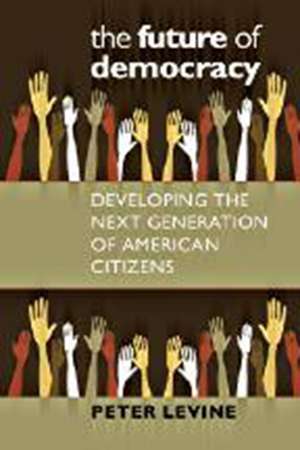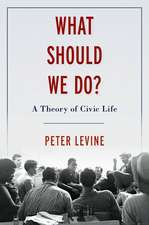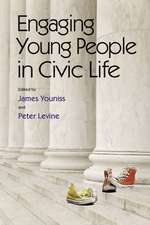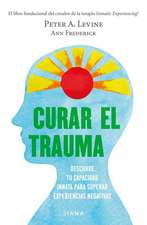The Future of Democracy: Developing the Next Generation of American Citizens
Autor Peter Levineen Limba Engleză Paperback – 5 ian 2015
We need young people to be civically engaged in order to define and address public problems. Their participation is important for democracy, for institutions such as schools, and for young people themselves, who are more likely to succeed in life if they are engaged in their communities. In The Future of Democracy, Peter Levine, scholar and practitioner, sounds the alarm: in recent years, young Americans have become dangerously less engaged. They are tolerant, patriotic, and idealistic, and some have invented such novel and impressive forms of civic engagement, as blogs, “buycott” movements, and transnational youth networks. But most lack the skills and opportunities they need to participate in politics or address public problems. Levine’s timely manifesto clearly explains the causes, symptoms, and repercussions of this damaging trend, and, most importantly, the means whereby America can confront and reverse it. Levine demonstrates how to change young people’s civic attitudes, skills, and knowledge and, equally importantly, to reform our institutions so that civic engagement is rewarding and effective. We must both prepare citizens for politics and improve politics for citizens.
Preț: 264.22 lei
Nou
Puncte Express: 396
Preț estimativ în valută:
50.56€ • 52.79$ • 41.84£
50.56€ • 52.79$ • 41.84£
Carte tipărită la comandă
Livrare economică 05-19 aprilie
Preluare comenzi: 021 569.72.76
Specificații
ISBN-13: 9781611687958
ISBN-10: 1611687950
Pagini: 304
Dimensiuni: 152 x 229 x 20 mm
Greutate: 0.45 kg
Ediția:1
Editura: University Press of New England
Colecția University Press of New England
ISBN-10: 1611687950
Pagini: 304
Dimensiuni: 152 x 229 x 20 mm
Greutate: 0.45 kg
Ediția:1
Editura: University Press of New England
Colecția University Press of New England
Notă biografică
PETER LEVINE is Director of CIRCLE, the Center for Information and Research on Civic Learning and Education, which he helped launch in 2001. He holds a doctorate in philosophy from Oxford University and is also Research Scholar at the Institute for Philosophy and Public Policy in the University of Maryland’s School of Public Policy. He has served as Executive Committee chair of the Campaign for the Civic Mission of Schools and in other advocacy roles. He has published five books and numerous articles on politics, civil society, the Internet, and moral philosophy, and literature.
Cuprins
List of Tables and Figures • Preface • Introduction • WHAT IS CIVIC ENGAGEMENT? • From Lists to a Definition • Legitimate Public Concerns • The ethics of Civic Engagement • “Open-ended” Politics • Conclusion • WHY DO WE NEED BROAD CIVIC ENGAGEMENT? • Democracy Should Not Depend on Civic Virtue Alone • Civil Society is a Necessary Complement to the Government • Equity Requires Broad Participation • Institutions and Communities Work Better when People Participate • Everyone Has Civic Needs • Civic Engagement Is Linked to Culture • Civic Participation Is Intrinsically Valuable • Democracy as Learning • MEASURES OF CIVIC ENGAGEMENT • Participation in Associations • Political Participation • Political Voice • Knowledge and “Cognitive Engagement” • What about Resistance? • Commitment to Purely Civic Goals • Conclusion • WHY DO WE NEED THE CIVIC ENGAGEMENT OF YOUNG PEOPLE? • Young People Have Distinct Interests • Civic Engagement Is Good For Young People • Improving Youth Civic Engagement Is the Most Effective Way to Enhance Civil Society • Youth Have an “Autonomous Culture” with Powerful Effects • HOW ARE YOUTH ENGAGING TODAY? • Trends in Behavior • Trends in Values • Differences by Income, Race, and Gender • Civic Innovation among Young People • WHAT ARE THE BARRIERS TO CIVIC EDUCATION? • Civic Education Is a “Public Good” • The Citizenship of Choice • Technocracy • The Lack of a “Civics” Discipline • Implications • CIVIC LEARNING IN SCHOOL • Courses • Discussions of Current Issues • Student “Voice” in Schools • Service-Learning • Extracurricular Activities • Simulations • Controversies in School-Based Civic Education • Implications for Policy • CIVIC LEARNING IN COMMUNITIES • Community Youth Development in After-School Settings • Digital Media Creation • Youth Participation in Local Government • DEVELOPMENTS IN HIGHER EDUCATION • A Generational Story • New Scholarly Attention to “The Public” • New Forms of Public Work • Policy Implications • INSTITUTIONAL REFORMS • Comprehensive High School Reform • New Forms of Journalism • Political Reforms • YOUTH CIVIC ENGAGEMENT WITHIN A BROADER CIVIC RENEWAL MOVEMENT • Elements of the Movement • The Strength and Growth of the Movement • Political Leadership for Civic Renewal • Notes • Bibliography • Index




























